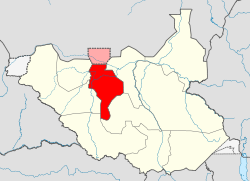Warrap paramount chief speaks out against tribal politics
March 25,2013 (JUBA) – A paramount chief in South Sudan’s Warrap state on Monday denounced leaders and politicians who talk about tribal allegiances, saying it was better for them maintain silence rather than divide people on tribal lines.

He described as “fools” people who consider their tribe as more superior than others.
Nyal said politicking along tribal lines must be strongly condemned and avoided by political leaders. He said that tribes in Warrap State have existed side by side in harmony with one another since the country became independent in July 2011.
“I am not a politician. I am a chief. I live with my people work with them. I don’t believe in tribe. We are in a multiparty democracy. People are free to vote for whoever they want to vote for. People must not be coerced to vote or support the government on tribal lines,” he said.
The traditional leader accused some South Sudanese politicians of acting “irresponsibly” by making divisive statements that have created false perceptions about the level of tribalism in the young nation.
Nyal said people from his area usually vote for politicians because of their programs and ideology, rather than where they came from in the country. Most of Warrap’s population are from the Dinka tribe, which is the largest ethnic group in South Sudan.
During the 1972 peace agreement and after the formation of a high executive council in Juba, the Warrap community voted for Abel Alier and Joseph Lagu, veterans of the Anyanya movement, despite these leaders not being from the area, he said.
Nyal said his community:
“Voted for them because we simply believed they had something to deliver. Abel Alier and Joseph [Lagu] are members from different communities in South Sudan. They were not from Warrap but our people, especially Ambrose Riiny Thiik who was one of the close cabinet ministers in the government of Abel Alier used to campaign for them. This shows that Dinka are not tribal. Other tribes also find votes in the area that are not coming from their tribesmen. So I don’t subscribe to this concept. We are in a democracy, where the choice of the majority prevails regardless of the tribe of the one who is at the helm of that political party of their choice.”
“A candidate who would ensure that there is service delivery because what people want is change. You see if you have nothing to talk about as a leader, let us just shut up and not talk about tribe all the time. Let us talk about the development of the country. Let us work together and help this country develop. We are people of one country. We are brothers and sisters of one country. Let us not waste time to divide ourselves on tribal lines.”
Tribal sentiments, he stressed, have the potential of dividing the nation, adding that leaders should preach peace and unity, not segregation among its citizens.
“We should not demonise each other on the basis of choices we never made. No one chose to be born in a particular area,” he said, without disclosing the tribes that he believes consider themselves superior to others.
(ST)
